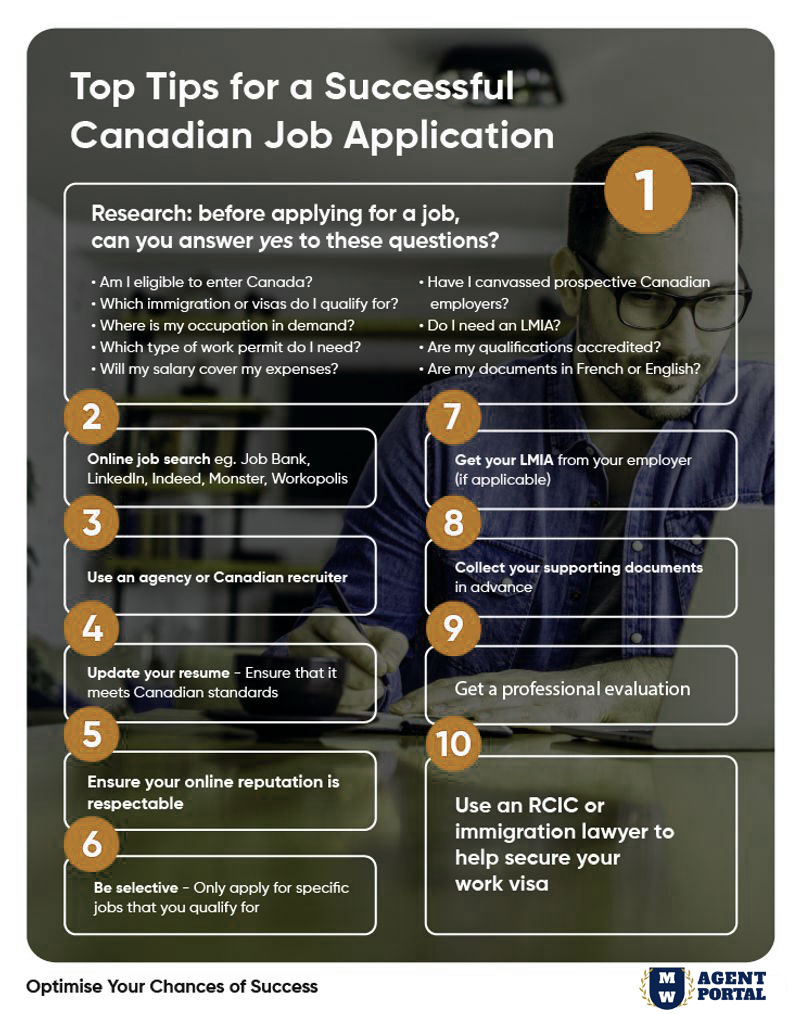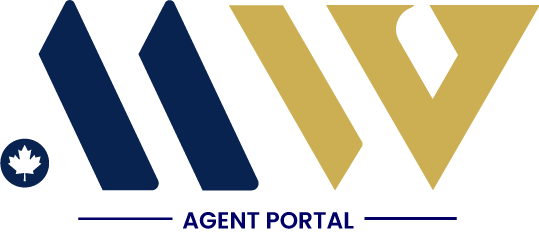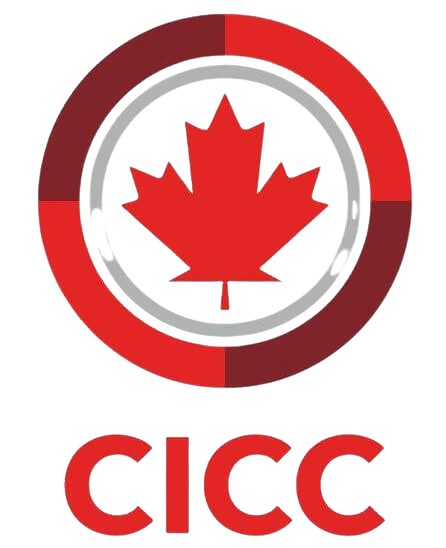How to Apply For Jobs in Canada
Finding and applying for a job in Canada from abroad can be challenging, but with the know-how, it certainly can be a little easier.
Although Canada’s labour market suffered job losses due to the pandemic, more than 200,000 newcomers are still making their way to work in Canada every year! Ready to find out how you can join them?
Where to Look for Jobs in Canada
Believe it or not, the best place to start looking for jobs in Canada is not on Canadian job sites. 
Step 1: Find Out Where Your Skills are Needed the Most
Knowing where in Canada your job is most in demand will not only increase the likelihood of you finding a job in Canada but also your immigration prospects.
Various immigration programs are points-based, allocating points to different factors such as:
- Your age
- Language ability
- Education
- Work experience
- Ability to settle in Canada.
These are the main factors that are taken into consideration however there are many other ways that you can earn more Comprehensive Ranking System (CRS) points. The CRS is the ever-popular Express Entry system points grid that ranks applicants applying for Canadian permanent residency.
You can earn extra points for applying with your spouse, having exceptionally high levels of French as well as having relevant work experience. But the way to earn the most CRS points in one move is to get a job in Canada and apply for a Provincial Nomination (PN). Why you may ask? Because it’s worth an incredible amount of points, 600 to be exact! That’s basically half the maximum amount of CRS points that you could earn.
Each province and territory has specific labour needs and its own list of in-demand occupations, which is why each Provincial Nominee Program (PNP), the immigration program that exclusively offer PNs, is different from the next. In short, the more points you have, the higher your chances of getting an Invitation to Apply (ITA) for permanent residency, which means choosing the right province is crucial when applying for a job or visa for Canada.
Step 2: Start Exploring Canadian Job Sites
Now that you know which province needs your specialized skills, you can start narrowing down your job search to specific provinces or territories. Some popular job sites include:
- Job bank
- Indeed
- Monster
- Workopolis
Step 3: Make Sure Your Resume is Up to Scratch
Canada has very high standards when it comes to employing foreigners. Your resume is the first opportunity you’ll have to make a lasting impression on your potential future employer. To get that coveted job interview, it’s important to not only make sure that your resume is equal to Canadian standards but also to make sure that it stands out from the rest.
It is also important to make sure that your resume is up to date and does not have any gaps in your work history. This usually raises a red flag with recruiters as it leaves them wondering what you were doing during that period of time and why you were unemployed.
And finally, don’t forget to add a cover letter to help land that dream job in Canada. This is what helps motivate your application and tells the recruiter or your prospective employer how you can add value to the company and why you want to work there.
Step 4: Be Selective When Choosing Which Jobs You Apply For
Be selective when applying for jobs in Canada. Applying for 50 jobs a day in the hopes that at least one recruiter will reply is not the best way to go, especially since many recruitment companies will run listings for job vacancies for different companies.
Now imagine you’re that recruiter receiving at least 5 applications for different jobs openings in Canada. The impression you’re giving is that you will take any job you can find and possibly that you are not serious about wanting a specific job.
Step 5: Get Started With the Application Process!
Now that you’ve really narrowed down your search and have perfected your resume, you can confidently start applying for work in Canada, which could potentially help increase your chances of getting Canada PR too! Ready to start the career of a lifetime? Not sure where to start with your visa application? Not to worry. The team of visa and immigration professionals that we work with is more than qualified to assist you with your application and has a vast knowledge of the Canadian immigration system.
Top Reasons to Work in Canada
Canada is a big beautiful country filled with a wide variety of lucrative job opportunities in every province or territory. Name any industry, and you’ll find a job vacancy for foreigners in Canada. But let’s take a look at the top eight reasons to consider working in Canada.
1. Earn a Globally Competitive Salary
Canada’s average annual salary per year, in 2021, is about $54,630 or $1,050.59 per week. This is four percent higher than 2019, which is quite amazing seeing as there were quite a few job losses due to the pandemic. This just goes to show how stable Canada’s economy really is and how much you could stand to earn when you decide to work in Canada.
2. Incredible Work Benefits
Canada’s offers its employees a range of benefits, including:
- Paid parental leave (including “daddy days”)
- Job security
- Training or Upskill opportunities
- Great health and wellness programs
3. Wide Variety of In-Demand Jobs
As mentioned earlier, just drop a pin anywhere on the Canadian map, choose any job sector and you’re bound to find at least one job vacancy. There are currently over 34,179 jobs available in Canada, and this is just what’s listed on one very popular job site. To find out where your job is in demand, take a look at the various provincial in-demand jobs and programs.
4. Relatively Low Cost of Living
Now this, of course, depends on where you decide to live and work in Canada. Popular city centers such as Vancouver, Toronto, and Victoria are among the most expensive cities to live in, in Canada. But there are many other cities that offer a great quality of life without sacrificing the comforts of urban life or most of your salary. Cities like Edmonton (Alberta), Hamilton (Ontario), and St, John’s (Newfoundland & Labrador) all offer a high quality of life at a reasonably low cost of living.
| Average Cost of Living by Province | |
|---|---|
| City | Estimated Cost of Living (Monthly in Canadian Dollars) |
| Toronto | 2,300 |
| Vancouver | 2,300 |
| Victoria | 2,100 |
| Halifax | 2,000 |
| Ottawa | 2,000 |
| Oshawa | 1,950 |
| Calgary | 1,900 |
| Edmonton | 1,850 |
| Hamilton | 1,850 |
| Montreal | 1,800 |
| London | 1,800 |
| Kitchener | 1,800 |
| Winnipeg | 1,800 |
| Windsor | 1,700 |
| Quebec City | 1,600 |
5. Exceptionally High Quality of Life
No matter where you decide to settle down in Canada, you will never have to worry about sacrificing the quality of life that you want for yourself and your loved ones. Canada has a universal healthcare system that is open to all citizens and permanent residents, free of charge. Its exceptional education system is world-renowned and also does not cost a thing. Canadian believe in equality and quality, which means that you can rest assured that you and your family will be living in one of the best countries in the world.
6. Shorter Work Hours, Longer Vacations
On average most Canadians work approximately 40 hours per week (full-time) and around 18.5 hours per week (part-time). On average most Canadian get around 10 paid vacation days. All provinces have a guaranteed 2 weeks except Saskatchewan which has an incredible 3 weeks holiday. This usually increases the longer you stay with the same employer annually.
- 1 completed “year of employment” – 2 weeks
- 5 completed consecutive “years of employment” – 3 weeks
- 10 completed consecutive “years of employment” – 4 weeks
And to top it off, Canada has nine statutory holidays, which means that you could get anywhere from 19 to 37 days off every year!
7. Enjoy Work-Life Balance
Most Canadian companies pride themselves on making sure that their employees have a healthy and happy work-life balance. What does this mean exactly? According to the Canadian Centre for Occupational Health and Safety (CCOHS), there are two main aspects to consider when talking about work-life balance:
- lack of time and scheduling conflicts; and
- feeling overwhelmed, overloaded, or stressed by the pressures of multiple roles.
6.98 million Canadians, on average, work just 40 hours per week and about 84 percent of large Canadian companies offer some form of wellness program. Other initiatives that Canadian employers implement to create a healthy work environment is by offering benefits such as:
- On-site childcare;
- Flexible working arrangements;
- parental and family leave;
- educational leave, community service leave, or sabbaticals;
- Employee assistance programs;
- On-site seminars and workshops;
- internal/external educational training opportunities; or
- Fitness facilities or membership assistance;
8. Qualify for Permanent Residency
If you are living and working in Canada on a temporary Foreign work permit, you may be happy to know that after gaining at least one year of work experience you may be eligible to apply for permanent residency through programs such as the Canada Experience Class (CEC).
Although the CEC is mainly for highly skilled workers, there are also various provincial programs that offer permanent residency to foreign workers at various skills levels with work experience of as little as just six months!
Preparing for your Job Interview
 Being prepared in any avenue of life is essential for success. It’s a good idea to prepare yourself for a flawless interview by:
Being prepared in any avenue of life is essential for success. It’s a good idea to prepare yourself for a flawless interview by:
- Rehearsing some practice questions and answers beforehand
- Researching the company and job role
- Motivating your reasons to want to work in Canada
- Knowing your resume and organize your portfolio
- Preparing for the actual interview ahead of time
Ready to Start a Successful Visa Application?
Having professionals in your corner that you can trust is extremely important. Always be sure to research which consultants are accredited and are able to provide you with the guidance and support that you need to make your work and/immigration goals achievable. Need help starting the journey of a lifetime after landing your dream job in Canada?
Immigration FAQ’s
Your Comprehensive Ranking System (CRS) is based on the following factors:
- Provincial Nomination;
- Offer of employment;
- Core capital factors;
- Your common-law partner or spouse;
- Skill transferability;
- Previous Canadian study experience;
- Siblings in Canada; and
- French and English Ability
Provincial Nomination (600 Points)
600 points are awarded for an enhanced Nominee certificate from a province in Canada through the Provincial Nominee Program (PNP).
Job Offers (50-600 Points)
A Canadian job offer will also earn you points; the number of points is based on the NOC level of the particular job.
Core Human Capital Factors (600 Points)
These take into account your level of education, for example:
- Certificate;
- Diploma; or
- Degree
If you intend to gain higher qualifications, your score will increase. This same point system applies to your legal partner or spouse if you applied together.
Language (150 Points)
Improving your language skills in either English or French through a recognized Canadian institution can also raise your CRS score.
Work Experience
The more experience you have, the more points you earn. This also applies to your legal partner or spouse.
You must:
- Meet all the requirements of the:
- Federal Skilled Worker Class (FSWC);
- Federal Skilled Trades Class; or
- Canadian Experience Class
You must register with the Canadian Job Bank within 30 days unless:
- You have arranged employment from a Canadian employer; or
- You have received a nomination through the Provincial Nominee Program
You must have a Labour Market Impact Assessment in order to earn Comprehensive Ranking System points, unless you:
- Have worked full time for an employer with a work permit for a least one year (or a part-time job for an equal amount of time);
- Have a valid job offer from a Canadian employer that is for at least one year in duration; or
- Have a valid employer specific temporary work permit exempt under code R204 (a), (c) or R205
If you qualify for any of the Federal Programs, you have 30 days from when you submit your profile to complete the rest of the requirements like registering with the Job Bank. If you do not, your Express Entry profile cannot be activated.
There are three programs to apply for under Express Entry:
- Skilled Federal Worker Program (SFWP);
- Skilled Federal Trades Program (SFTP); or
- Canadian Experience Class (CEC)
The following factors affect your eligibility:
Work Experience
You must:
- Have gained relevant work experience for a job listed in the National Occupation Classification (NOC). Note: Work experience gained in another occupation you have not applied for does not apply;
- Have gained work experience in the past 10 years;
- Have received payment for your work;
- Have a job at skill level 0, A or B;
- Have a year’s worth of work experience (minimum 1,560 hours); and
- Prove that your work experience fits the requirements of the NOC
Language Ability
You must:
- Meet the minimum language level set by the Canadian Language Benchmark (CLB);
- Take a language proficiency test That is approved by IRCC;
- You must meet the language requirements for either French or English; and
- Your language test results must not be more than two years old when you apply
Education
You must:
- Have completed canadian secondary education; and a tertiary certificate, diploma or degree;
- Have completed foreign credentials; or
- Have an Educational Credential Assessment (ECA) approved by IRCC
Proof of Funds
You must prove you can support yourself and your family financially, unless:
- You are working in Canada; or
- You have a valid job offer from a Canadian employer
Additional Factors to Be Considered
- Age;
- Valid job offers; and
- Adaptability
This program is aimed at people who wish to become permanent residents (PR) of Canada. This only applies to people who qualify in a skilled trade.
Minimum Requirements
You must:
- Plan to live outside of Quebec (The province has its own Quebec Skilled Worker Program);
- Meet the language requirements for English and French;
- Have two years’ work experience in a skilled trade (or equal amount of experience in a part time position;
- Have work experience within the past 5 years;
- Meet the job requirements in the National Occupational Classifications;
- Have a full-time job offer from a Canadian employer for a minimum of one year; or
- A certificate of qualification for that skilled trade that is confirmed from the Canadian provincial or territorial government authority
Skilled Work Experience
These skilled trades are involved in the Federal Skilled Trades Program as ranked by the National Occupational Classification.
| Group Number | Job Description |
|---|---|
| 72 | Industrial, construction or electrical trades |
| 73 | Equipment operation and maintenance |
| 82 | Technical and supervisors in:
|
| 92 | Processing, manufacturing and utilities supervisor Central control operators |
| 632 | Cooks and chefs |
| 633 | Bakers and butchers |
Education
You do not need a specific qualification for this program, but you can earn more CRS points if you have:
- Foreign qualifications;
- An Educational Credential Assessment (ECA) approved by IRCC;or
- A Canadian certificate, diploma or degree
Language Ability
- Pass the Canadian Language Benchmark test at minimum language level;
- The language test must be approved by IRCC; and
- Your test results must not be older than two years when you apply.
Be assessed by the province or territory
Each of the provinces or territories have different requirements for the skilled trade industry.
Minimum Requirements
Minimum Requirements
You must:
- Have skilled work experience for at least 12 months (either full time or part time for the same amount of time) within three years before you apply;
- Have the required language skills needed for your job;
- Have gained experience in Canada with proper authorization;
- Have the language proficiency needed for your job; and
- Have plans to live outside of Quebec
Skilled Work Experience
Work experience must be gained in the following job levels based on the National Occupational Classifications.
| Job Description | Skill Type |
|---|---|
| Technical jobs | B |
| Skilled trades | B |
| Professional jobs | A |
| Managerial jobs | 0 |
Education
You do not need an education to apply for this program, but you can score higher if you:
- Have a high school diploma, tertiary diploma or degree;
- Have an Educational Credential Assessment (ECA) approved by IRCC; or
- Have completed foreign credentials
Language Ability
To qualify you must score well in the various language tests determined by the CEC.
| Canadian Language Benchmark Score Needed | Job Level (NOC) |
|---|---|
| 7 | 0 |
| 7 | A |
| 5 | B |
The language test must be approved by IRCC and must not be older than two years when you apply.
- Have skilled work experience for at least 12 months (either full time or part time for the same amount of time) within three years before you apply;
- Have the required language skills needed for your job;
- Have gained experience in Canada with proper authorization;
- Have language levels need for your job; and
- Have plans to live outside of Quebec
Note:work experience gained as a student or a self-employed individual does not count.
Skilled Work Experience
Work experience must be within three years of applying for the Canadian Experience Class. Work experience must be gained in the following job levels as based on National Occupational Classifications.
| Job description | Skill Type |
|---|---|
| Technical jobs | B |
| Skilled trades | B |
| Professional jobs | A |
| Managerial jobs | 0 |
Education
You do not need an education to apply for this program, but you can score higher if:
- have a high school diploma and/or tertiary diploma or degree;
- have an Educational Credential Assessment (ECA) approved by Immigration, Refugees and Citizenship Canada; or have
- completed foreign credentials
Note: Only apply for an Educational Credential Assessment (ECA) if your foreign education is either equal to, or higher than the Canadian education standard.
Language Ability
To qualify you must score well in:
- the Canadian Language Benchmark; and
- the language tests
| Canadian Language Benchmark score needed | Job level (NOC) |
|---|---|
| 7 | 0 |
| 7 | A |
| 5 | B |
The Language Test must be approved by the Immigration, Refugees and Citizenship Canada .These tests are based off your French and English ability to:
- Read;
- Speak;
- Listen; and
- Write
Your test results must be included if you are applying for this program through the Express Entry program. Note: these tests must not be older than two years when you apply.
Principal Applicant
When you apply for the Express Entry, and want to immigrate with your common law partner, you must choose who will be the principal applicant.
Note: a common law partner is a person who has been married to you for one year. This applies for same sex and opposite sex partners.
Choose the principal applicant by looking at who will score the highest points under the Express Entry program.
Inadmissibility
You may be inadmissible if you are:
- Considered a security risk;
- Lied about information in your application or interview;
- Have ties to organised crime;
- Can’t support yourself financially;
- Have terrible financial health;
- Committed a crime outside of Canada;
- Do not qualify under Canada’s immigration laws; and
- Have a family member that is not allowed in the country
Choosing Where To Live
Note:under the Express Entry you can apply to live in other provinces/territories in Canada, except Quebec. This province has its own set of requirements needed for you to enter.
These are the factors that are used to calculate CRS Points
- Age (max 110 points);
- Education (max 150 points);
- Language proficiency (max 160 points);
- Canadian Work Experience (max 80 points);
- Skills Transferability (max 100 points); and
- Additional Factors (max 600 points)
A legal agent is an authorized representative that must be:
- A paralegal or lawyer who has a good relationship with the provincial or territorial legal societies of Canada;
- A Regulated Canadian Immigration Consultant (RCIC) who has a good relationship with the Immigration Consultants of Canada Regulatory Council; or
- A notary who has a good relationship with the Chambre des notaires du Québec
Note: An unauthorized agent will not be able to help you with your application.
If you want to ensure that your Registered Canadian Immigration Consultant (RCIC) is an authorized consultant, you can check with the Immigration Consultants of Canada Regulatory Council (ICCRC).
The ICCRC’s website has a register of all the persons that are qualified to be Canadian Immigration Consultants. Any individual who claims to be a legal consultant will have a RCIC code. If there are no results for a person’s RCIC code, then they are not a legal Canadian Immigration Consultant.





